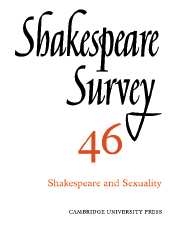Book contents
- Frontmatter
- Shakespeare and Sexuality
- As Who Liked It?
- Malvolio and the Eunuchs: Texts and Revels in Twelfth Night
- The Scandal of Shakespeare’s Sonnets
- Weaving and Writing in Othello
- ‘That’s She that was Myself’: Not-so-Famous Last Words and Some Ends of Othello
- ‘The Catastrophe is a Nuptial’: The Space of Masculine Desire in Othello, Cymbeline, and The Winter’s Tale
- Reconstructing The Winter’s Tale
- Late Shakespeare: Style and the Sexes
- The Virgin Not: Language and Sexuality in Shakespeare
- Fleshing his Will in the Spoil of her Honour: Desire, Misogyny, and the Perils of Chivalry
- Bowdler and Britannia: Shakespeare and the National Libido
- Shakespeare and the Ten Modes of Scepticism
- Shakespeare Performances in England, 1992
- Professional Shakespeare Productions in the British Isles, January-December 1991
- 1 Critical Studies
- 2 Shakespeare’s Life, Times, and Stage
- 3 Editions and Textual Studies
- Books Received
- Index
Malvolio and the Eunuchs: Texts and Revels in Twelfth Night
Published online by Cambridge University Press: 28 March 2007
- Frontmatter
- Shakespeare and Sexuality
- As Who Liked It?
- Malvolio and the Eunuchs: Texts and Revels in Twelfth Night
- The Scandal of Shakespeare’s Sonnets
- Weaving and Writing in Othello
- ‘That’s She that was Myself’: Not-so-Famous Last Words and Some Ends of Othello
- ‘The Catastrophe is a Nuptial’: The Space of Masculine Desire in Othello, Cymbeline, and The Winter’s Tale
- Reconstructing The Winter’s Tale
- Late Shakespeare: Style and the Sexes
- The Virgin Not: Language and Sexuality in Shakespeare
- Fleshing his Will in the Spoil of her Honour: Desire, Misogyny, and the Perils of Chivalry
- Bowdler and Britannia: Shakespeare and the National Libido
- Shakespeare and the Ten Modes of Scepticism
- Shakespeare Performances in England, 1992
- Professional Shakespeare Productions in the British Isles, January-December 1991
- 1 Critical Studies
- 2 Shakespeare’s Life, Times, and Stage
- 3 Editions and Textual Studies
- Books Received
- Index
Summary
... a good practise in it to make the steward beleeue his Lady widdowe was in Loue wth him by counterfayting a lettr
John ManninghamHe that is unmarried careth for the things that belong to the Lord, how he may please the Lord: But he that is married careth for the things that are of the world, how he may please his wife.
1 Corinthians, 7, 32-3Now she that is a widow indeed, and desolate, trusteth in God, and continueth in supplications and prayers night and day.
But she that liveth in pleasure is dead while she liveth.
1 Timothy, 5, 5-6Fashionably enough, the central farcical scene of Twelfth Night concerns an act of reading. What Malvolio reads and how he reads it have significant connections both with other events in the play, and with the wider world of seventeenth-century English society. The letter he finds invites him to join the festive rituals of love - to disguise himself, to smile, and to become a wooer, on the expectation of ending the revelling with epithalamium and marriage. This model for human conduct - the argument of romantic comedy - is in fact endorsed by a secondary text hidden within the first, as we shall see. But Malvolio, reading the words eagerly in the light of his predisposition, sees no subtleties, let alone the gaping trap. The festival in which he has already begun to take part is not the affirmative and sustaining one he imagines, but a punitive, defaming, mocking ritual aimed at him, his pride, pretensions, and authority. His reading — or misreading — marks his entry to a festive world, and festivals, like texts, are ambiguous. Particularly his treatment at the hands of the plotters forms a suggestive inverse ritual to set against those patterns which are traced by the energies of misplaced and baffled erotic desire, eventually untangled and fulfilled.
- Type
- Chapter
- Information
- Shakespeare Survey , pp. 23 - 34Publisher: Cambridge University PressPrint publication year: 1993

